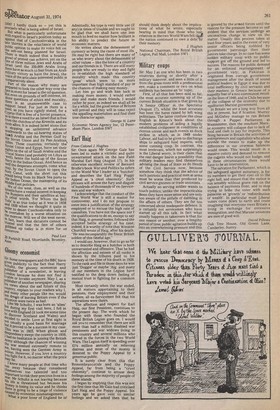Military coups
Sir: May I as one who has been in two countries during or shortly after a military takeover, and seen a little of it from the grass roots with a professional eye, make a comment or two on what suddenly has become an an' topic. First, of all that has been said so far, the most accurate summing up of the current British situation is that given by 'A Senior. Officer' in the Spectator (August 17), whilst the least accurate has been the hares raised by left wing politicians. The latter confuse the clear English in Kitson's book about the modern problems of aiding a legally established civilipower in conditions of riotous unrest and such events as dock strikes in which, as in 1949 under Labour, aid had to be given to discharge ships to safeguard food imports, with some cunning coup. In contrast, the most irrelevant, which not surprisingly is the Liberal worry, is their claim that the real danger liewin a possibility that military leaders may find themselves advising the Head of State as do Heads of the Civil Service now, because somehow they think that the advice of such patriotic and practical men at arms must be worse than that produced by civil service gnomes or trade unionists.
Actually no serving soldier wants to touch politics; unlike the impracticable Benn they have more sense and are only too aware of the pitfalls of dabbling in the affairs of others. They are far too concerned about inadeqaute defence. It is certainly not servicemen who have started up all this talk. In fact what usually happens in takeovers is that for one reason or another, over a lengthy period of time, public agitation builds up into an overwhelming pressure and this
is ignored by the armed forces until the reasons for the pressure become so self evident that the services undergo an unconscious change in view on the matter. Usually this process takes at least four years; and in the event of very senior officers being nobbled by government patronage then their juniors take charge. In no case has some sudden military coup with no public support got off the ground and led to success. The reasons for public demand for an enforced rearrangement of government vary; in Pakistan it originated from corrupt government management after the death of sound political leaders; in Egypt it was due to total inefficiency by civil servants and their masters: in Greece because of a majority fear of a neo-communist revolt on the lines of 1946; and in Chile because of the collapse of the economy due to egalitarian Marxist government. In Britain we are a long way from all this at present, but if Scanlon, Murray and McGahey manage to run Britain through a Puppet Parliament at Westminster, then the resultant Marxist economy will collapse due to lack of food and cash to pay for imports. This Being because in Britain the activities of entrepreneurs and capitalists who alone provide the means to make up the differences in our overseas balances would cease. This would result in a massive outcry and demand to remove the culprits who would not budge: and in these circumstances there would have to be an intervention. The salvation for Parliament. which is the safeguard against autocracy, is for its members to get their eyes on to the right ball, and ensure that the nation is run sensibly without grave risk on the balance of payments front, and to stop trying to bribe the voter with such panaceas aS• 'growth' or 'redistribution of wealth'. In particular must Liberal voters come down to earth and cease imagining that everyone owes Britain a living in exchange for excessive immigration, and that Marxist unionists are men of good will.
David Pilleau Oak Tree House, Old Green Lane, Camberley, Surrey


































 Previous page
Previous page